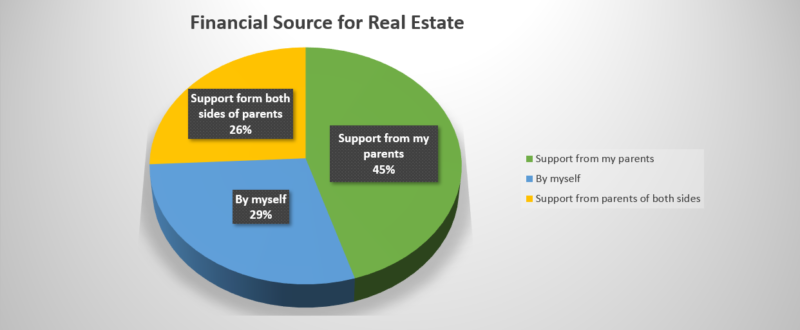China’s real estate market 2019
The number of Chinese women purchasing properties is rapidly growing, according to a report released by the real estate information platform BEIKE (贝壳找房 Beike zhaofang) in March 2019. This report analyzed over 60,000 second-hand housing transactions in 2018 from 12 major cities in China – including Beijing, Shanghai, Shenzhen and Hangzhou – and found out that the female homeowner ratio in China reached 46.7% in 2018 (from the age group of 18 to 50), while the number was only by 5% as of 2016.
Tang, a real estate salesperson from Guangzhou told Southern Weekly in an interview: “I’ve been working in real estate for 3 years; I can feel the increase of Chinese women purchasing homes. They are from all over the country and have different jobs and needs, but most of them are young – the majority are millennials. These female buyers are often well-educated and from wealthy families, and interestingly, many of them are single.”
Considering the custom of men providing marital homes, this trend of young women buying houses is worth shedding some light on. Why are more and more women in China purchasing properties? How can they afford the eye-popping price of Chinese housing? What mindset and mentality does this phenomenon reflect? And what impact does it have on the Chinese society? This article reveals some interesting insights into China’s real estate market from a unique angle.

Chinese women are searching for security from properties rather than marriage
China’s economic boom has created a generation of educated, independent, and career-driven women. Unlike their mothers or grandmothers, women from today’s generation – at least those who live and work in big cities – have changed their attitude towards traditional Chinese gender norms. Many Chinese women are taking high-paid jobs and becoming financially more independent. As a result, the self-esteem of urban women is high enough that more and more of them are no longer searching for life security from marriage. Instead of waiting for a future husband to provide them with a home, they rather purchase one themselves. With a property, Chinese women feel more confident to marry for love, rather than wealth. On the other hand, for those who moving to big cities to create a better life, owning a home also enable them to avoid the instability caused by tenement and gives them a strong sense of settling down.
The impact of the One-Child Policy on China’s real estate market
An HSBC study showed that 70% of Chinese millennials are homeowners, while the number is much lower in other countries: e.g., 41% in France, 35% in the US and 31% in the UK respectively. There is more: according to the BEIKE report, more than one-third single female homeowners over 30 pulled off a home purchase without a loan and more than a quarter own two properties or more. How is that possible considering the extremely high housing price in China compared to wages?
The One-Child Policy has played a crucial role. According to the same report, up to 45% of Chinese female homeowners over 30 have received financial support from their parents. Also, another 26% of them have purchased their properties by having support from their and their spouses’ parents. That leaves only 29% who afford their properties completely by their own. In general, Chinese parents are used to being involved in their children’s lives to a great extent. From marriage to home buying, they give advice, and, in some cases, they are the real decision-makers. Nevertheless, Chinese parents are extremely supportive for their children’s families. Many of them take care of the grandchildren full-time after their retirement and undertake the down payment or sometimes even more of their millennial children’s home. That puts millennials from the One-Child Policy to a more advantageous position on the real estate market in China.
Although the tradition expects men to provide homes, the mentality is shifting over the last years. Many parents are having a different attitude towards that issue: they do no longer mind being the provider of their millennial daughter’s marital home. Moreover, for many young women striving for a better life in big cities, a real estate means a settled place for themselves as well as their parents. A home purchase is often an investment for the whole family: it can be a spot for the family reunion when the left-behind parents come to visit their daughters in the city. Some parents from the older generation also plan to move in with their millennial children to take care of them and their grandchildren.

“Financial source for real estate from Chinese female homeowners over 30”]
The subtle influence of China’s Marriage Law on the trend of women buying houses
The change of Chinese Marriage Law in 2011 – requiring physical proof of monetary contribution – has diminished women’s ability to claim their rightful part of the marital property in the case of divorce. This especially puts women and her family in a disadvantageous position. The tradition of men providing marital home does not mean that women do not undertake monetary responsibility. Typically, the family of bride-to-be needs to give the so-called betrothal gift (彩礼 in Chinese, Caili), which can be cars, furniture, gold or cash varied from region to region. While men can easily leave “safe and sound” in the case of divorce, women and their family can lose all they have contributed. The change of Chinese Marriage Law has seemly forced many women and their family to invest in their own homes.
The reaction from China’s real estate market
In general, women place more importance in the appearance of a home, including interior decor and landscape. In recognition of the growing role of women as home buyers in China, developers have placed more emphasis on the presentation of show houses, including elements such as interior finishing. Moreover, life convenience such as access to public transit and educational facilities for children are important for female home buyers in China. According to the BEIKE report, 64.4% of houses owned by women over 30 have easy access to subway and 36.6% providing access to schools which is a significant challenge many Chinese families are facing. Zhang Fan, vice-president of Boill Holding Group, a Shanghai-based developer, said women were less concerned about the size of a home, as long as there were neighboring green areas, and close access to amenities like rail transit, shops, and hospitals.
Reflections and suggestions
Both the BEIKE report and many journalistic reports emphasized the growing purchase power of single women in China and indicated the increasing independence and liberty of women in China. However, some people are worried that this topic has been overused for commercial purposes. They assume that real estate developers are hyping this phenomenon as a strategy targeting single women. We have to keep in mind that Chinese consumers have become more mature and rational during the last decade. Marketers should be careful of using ‘home-owning’ as a criteria for a woman’s independence. This would only be another stereotype forced upon women. Rather, it is not a woman’s marital status or what materials she possesses that decides whether she is independent or not.
Author: Chencen Zhu
If you want to know more about the modern property market in China, to collect first-hand Chinese consumer insights about the real estate industry and to size your consumers demand, please do not hesitate to contact our team directly at dx@daxueconsulting.com.





